A COMPLAINT IS A GIFT BLOGS
We regularly post blogs that you are welcome to duplicate.
You can reprint or send the PDF file to your teams to use for team discussions.
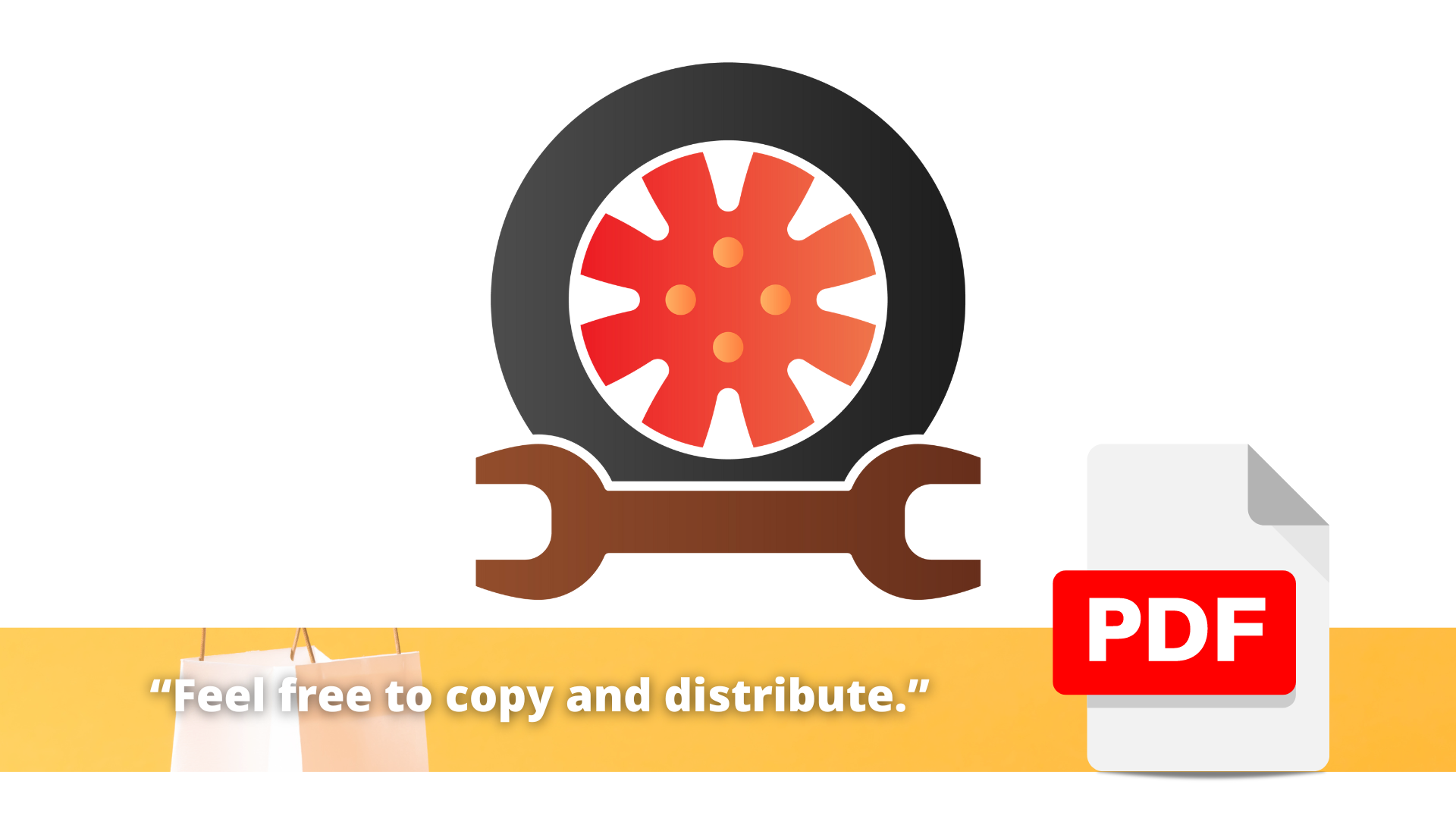
— by Janelle Barlow, Ph.D. ©All Rights Reserved. February 2024
GETTING INSIDE YOUR BRAIN…
TO BETTER UNDERSTAND CUSTOMER COMPLAINS
Janelle Barlow is shaking things up in 2024 with her blog by reviewing academic complaint research papers—one a month. If you find this information useful, feel free to copy the PDF file and share it with others. I think you will learn some fresh perspectives on complaint handling in 2024—according to researchers! Comments you make on LinkedIn will be read by others and will help the entire complaint handling community. Any mistakes in understanding and summarizing these research papers ae mine alone, and not the researchers. Thank you.
All rights reserved. Feel free to download the PDF file and distribute as you wish.
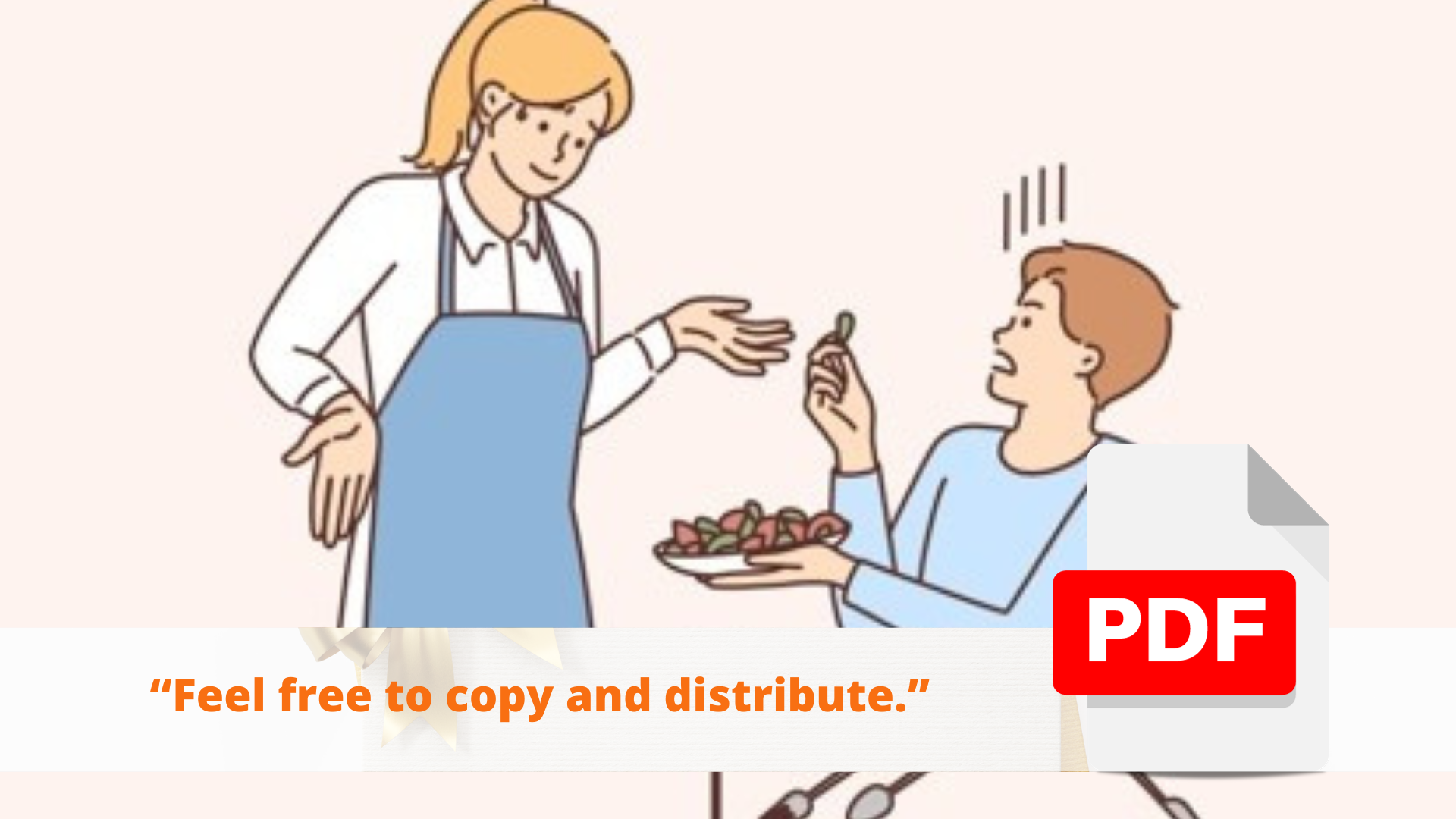
— by Janelle Barlow, Ph.D. ©All Rights Reserved. January 2024
GETTING INSIDE YOUR BRAIN… TO BETTER UNDERSTAND CUSTOMER COMPLAINS
Janelle Barlow is shaking things up with her blog by reviewing academic complaint research papers—one a month for the next year. Research written in academic language is not always easy to read or understand unless you read a lot of them, and even then, the language used can be obtuse. To make this information accessible, Janelle will cut through complex models and statistical data to pull out useful information that business people can actually use. Some of the articles are recent and some were written by noted researchers years ago. Janelle has reviewed all these articles that will be shared with you, plus hundreds more that sit on her desktop. Her comments are in italics throughout this review.
If you find this information useful, feel free to copy the link and share it with others. I think you are going to learn some fresh perspectives on complaint handling in 2024! Any comments you make on LinkedIn read by others will help the entire complaint handling community.
All rights reserved. Feel free to download the PDF file and distribute as you wish.

— by Janelle Barlow, Ph.D. ©All Rights Reserved. December 2023
Six Guidelines for Turning Complaints Into Customer Learning Experiences!
"Personally I'm always ready to learn, although I do not always like being taught." Winston Churchill
Customers, like British Prime Minister Winston Churchill, may be eager to learn what we have to teach them, but, as Churchill pointed out, education is a sensitive communication exchange and needs to be carefully handled so our customers don't feel talked down to.
Most parents learn quickly that if they do everything for their children, their youngsters will remain dependent on them. After a while, that's no fun for either. So, most parents will take the time and trouble to show their frustrated/complaining children how to do things for themselves. It gives children a greater sense of control over their lives, gives them the satisfaction of knowing how to take care of themselves, and perhaps most importantly, shows them they don't always need their parents around to get things done. The same is true for customers.
All rights reserved. Feel free to download the PDF file and distribute as you wish.

— by Janelle Barlow, Ph.D. ©All Rights Reserved. November 2023
Overcoming the Fear of Complaining: Fostering Customer-Centric Changes with Five Strategies
In today's competitive business world, customer feedback is invaluable for improving and maintaining loyalty. However, the fear of retribution often stifles customers from voicing their concerns. A study revealed that fear of worsening their situation is the second most common reason people don't complain. A recent personal encounter shed light on the need for organizations to create environments where customers can voice their grievances without fear.
I boarded a flight from Las Vegas to Phoenix on a scorching hot Sunday afternoon. With temperatures soaring around 110°F, the heat overwhelmed everyone on the plane. After prompt boarding announcements, we sat and sweltered on a non-airconditioned aircraft parked next to the gate. Passengers attempted to cooperate; an on-time departure was imminent.
All rights reserved. Feel free to download the PDF file and distribute as you wish.

— by Janelle Barlow, Ph.D. ©All Rights Reserved. October 2023
Navigating Misinformation: Elevating Customer Service in an Age of Errors
In the intricate dance between customers and businesses, misinformation too often sneaks in like an unexpected plot twist. We've all been there, nodding along to advice only to realize later that we've been led astray. It's an unfortunate reality, but it's how a company handles such hiccups that truly defines its commitment to customer satisfaction.
Let me transport you to a wintry escapade in Pittsburgh. I checked into a renowned hotel, and eagerly sought a swim. As the hotel itself lacked a pool, it did have an arrangement with a local health club. Armed with directions from a well-meaning hotel representative, I trudged through a blizzard, fueled by anticipation. Guess what happened?
All rights reserved. Feel free to download the PDF file and distribute as you wish.

— by Janelle Barlow, Ph.D. ©All Rights Reserved. September 2023
Give Your Power Away or Push Your Customers Away!
In the heart of Zagreb, Croatia, amidst the charm of cobblestone streets and the echoes of rich history, lies the exquisite Opera Hotel. A place where luxury meets old-world allure; it was here that a seemingly ordinary checkout experience left an indelible mark on my perspective about business success — or the lack of it.
As I stood in the lobby, preparing to leave the Opera Hotel early in the morning, I couldn't help but marvel at the seamless blend of classic elegance and modern comfort that surrounded me. The concierge had been the epitome of professionalism throughout my stay, ensuring every detail was immaculately attended to. However, during my final moments, a simple customer exchange would encapsulate the essence of unempowered service and a powerful insight into the business world.
All rights reserved. Feel free to download the PDF file and distribute as you wish.

— by Janelle Barlow, Ph.D. ©All Rights Reserved. August 2023
The Power of Recognizing Customer Emotions in Complaint Handling
Recognizing the role of emotions in customer complaints is crucial. Merely solving the issue is not enough, as frustrated customers may be looking for more than just a solution to their problem. They may be sending a message to others, they could be making a decision about whether they want to stay with the supplier, or they may want to be recognized for the difficulties their problem created. Extensive research reveals that customers seek
both
problem resolution and emotional recognition. This blog explores the importance of acknowledging and addressing customer emotions, highlighting how when you hit the sweet spot, you foster stronger relationships and customer loyalty.
All rights reserved. Feel free to download the PDF file and distribute as you wish.

— by Janelle Barlow, Ph.D. ©All Rights Reserved. July 2023
How to Get More Feedback
In last month's blog (June 2023), I emphasized that managers don't always know why their customers leave the business, never to return. One of the obvious answers is they don’t hear customer complaints. If they heard complaints they could begin to figure out why their customer base is shrinking.
Customers may be picking up subtle clues that tell them not to complain. They assume voicing a complaint may make them look picky, irritated, or bossy. No one may have asked them about what has happened. How can you get more feedback, particularly valuable feedback, from your customers, who, after all, are the ones experiencing your service?
All rights reserved. Feel free to download the PDF file and distribute as you wish.

— by Janelle Barlow, Ph.D. ©All Rights Reserved. June 2023
More Feedback is Much Better Than No Feedback
Normally when I tell company leaders they should be looking for more complaints, not fewer, I see shocked looks on their faces. It’s a look with which I am well acquainted. Some will say, “Wait a minute. We want fewer complaints, not more.”
At first glance, fewer complaints seem desirable. But when managers begin to think about the potential loss of non-complaining customers, they begin to see that more feedback is better than no feedback.
All rights reserved. Feel free to download the PDF file and distribute as you wish.
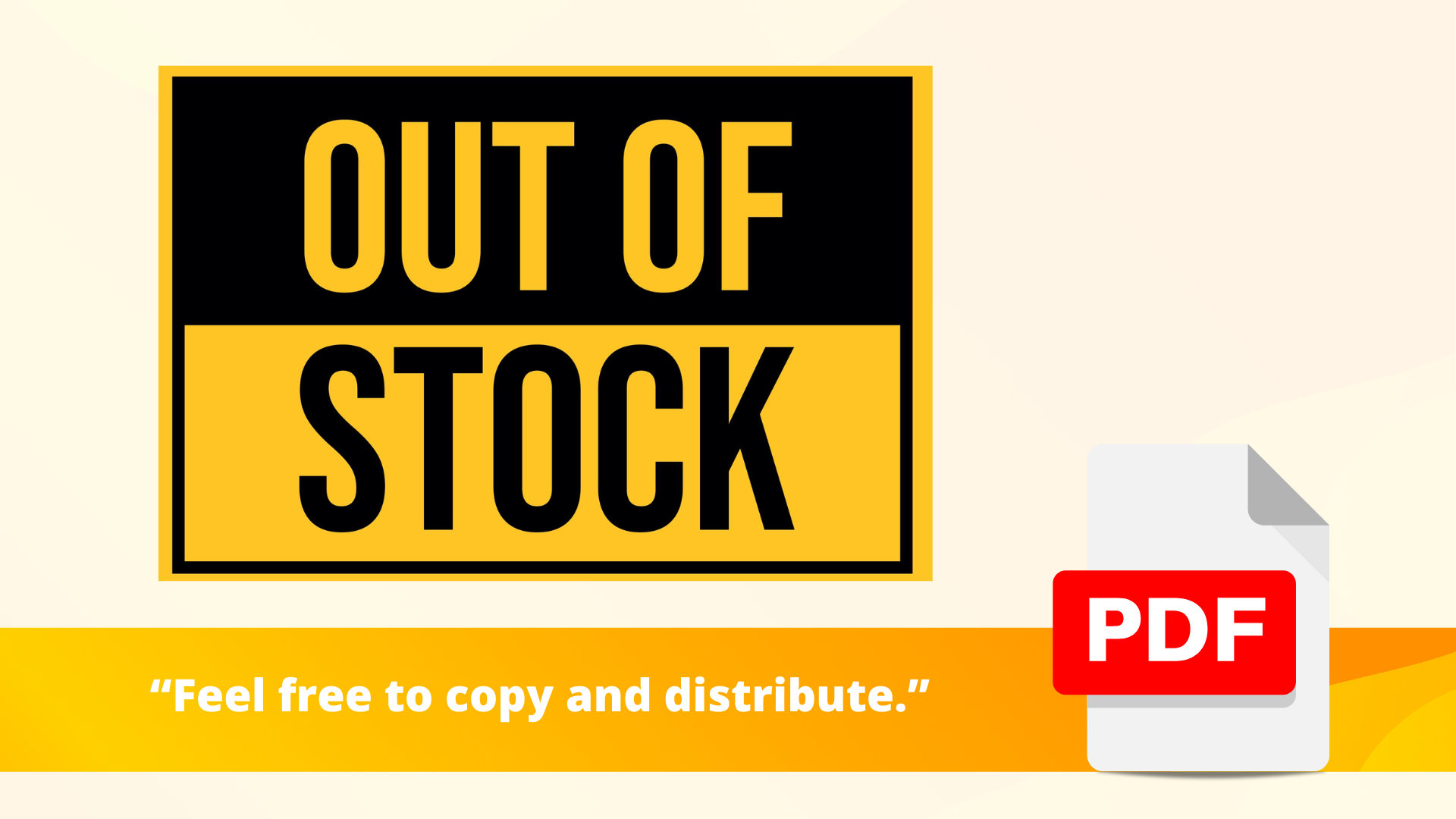
— by Janelle Barlow, Ph.D. ©All Rights Reserved. May 2023
Service Rapport vs. Service Fairness
No doubt about it, customer focus is important whether you are in the service business or the manufacturing business. But there are slightly different twists to how that customer focus works whether for a service or a manufacturing business.
We know, and the research confirms, that attitudes and behaviors of Customer Service Representatives (CSRs) are crucial and stand out in the service industry.
The challenge for CSRs who handle product complaints is that the cause of the complaint may have little to do with the CSRs’ behavior or attitudes. If the CSR is not empowered to handle a problem with a product, CSR behavior and attitudes may have limited impact on customer satisfaction.
All rights reserved. Feel free to download the PDF file and distribute as you wish.
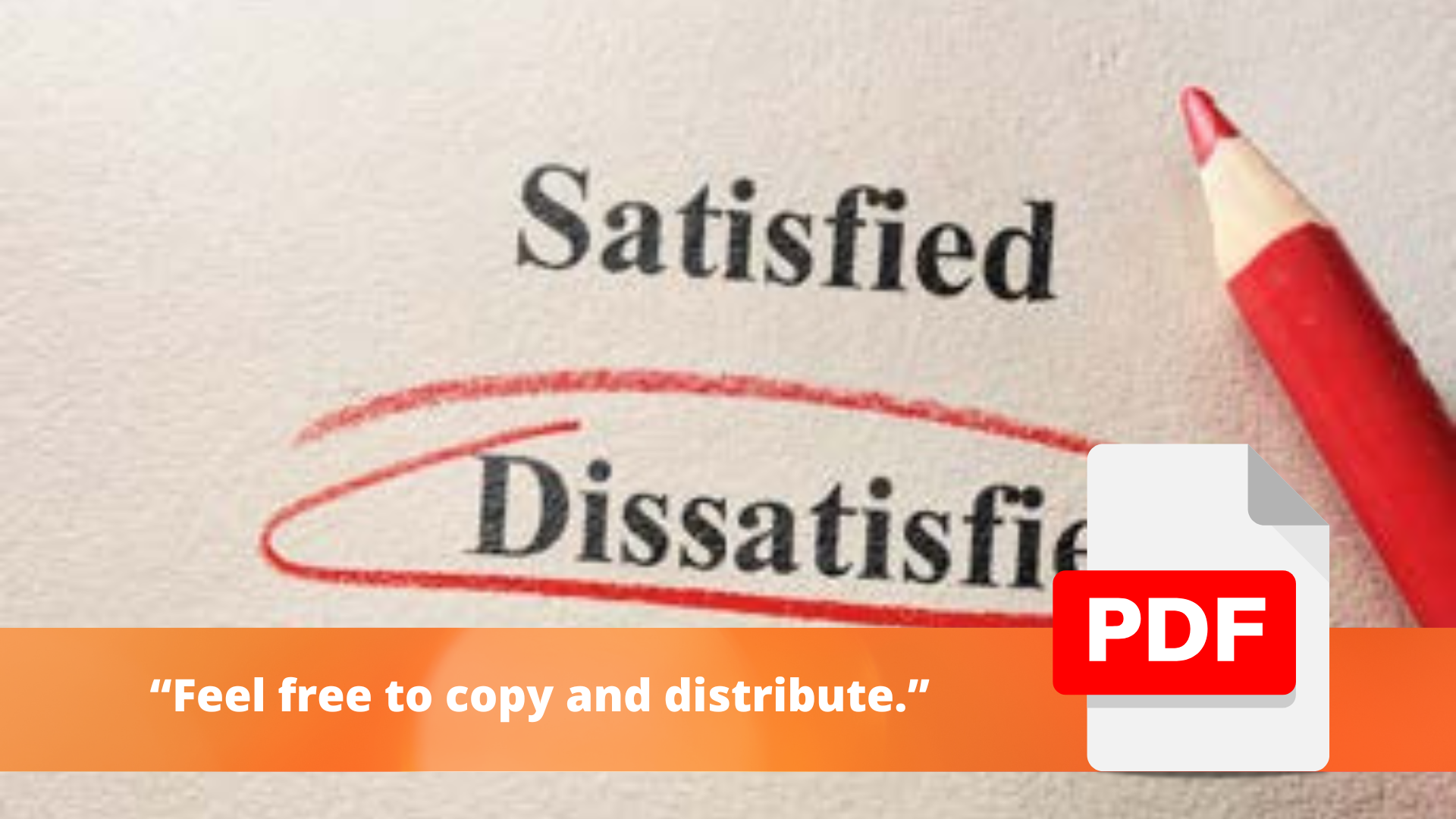
— by Janelle Barlow, Ph.D. ©All Rights Reserved. April 2023
What Do Customers Want When They Complain?
Every customer is unique just as every person is a singular entity. This means we all want different things when we complain. We even want different things at different times of the day, depending on whether we are hungry, tired, or rushed. We are, in short, a basket of varying emotions, wants, and needs.
What we want is also affected by which country we inhabit. Our culture may have taught us to “grin and bear it,” or we have learned from past experience that complaining does little good. So what we want may be minimal because getting rejected is easier to bear when we have low expectations.
But one thing we know for sure is that many customers are dissatisfied with how their complaints are handled and resolved. Surprisingly, with all the attention paid to customer satisfaction, most businesses aren’t very good at complaint handling.
All rights reserved. Feel free to download the PDF file and distribute as you wish.

— by Janelle Barlow, Ph.D. ©All Rights Reserved. March 2023
Empathy Matters
I once received service that was so touching it turned me into a loyal customer—even though it was other parties that caused the complaint. Whoever displays empathy, regardless of responsibility for the complaint, gives a sense of connection that enables all troubles to float away.
All rights reserved. Feel free to download the PDF file and distribute as you wish.
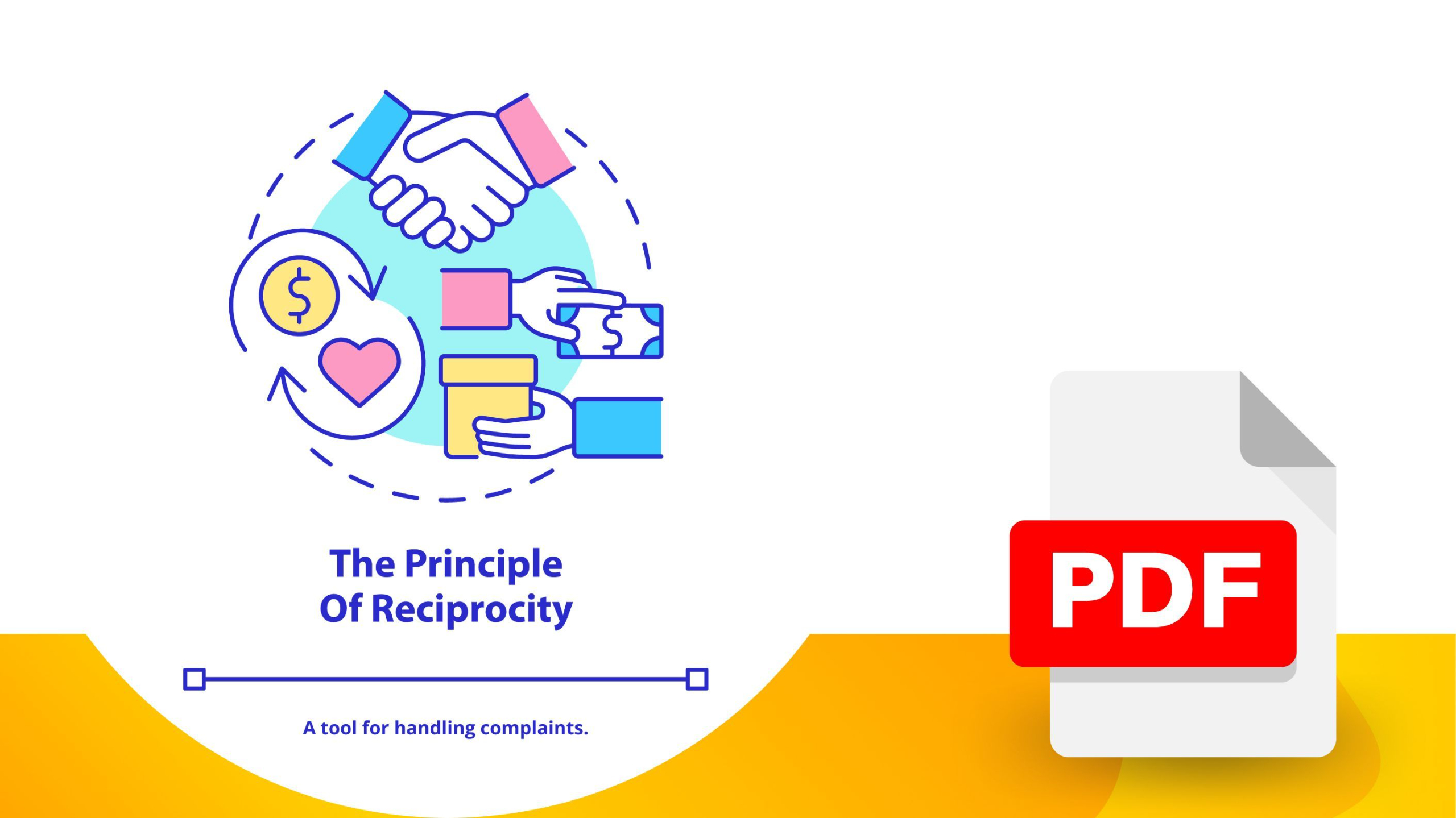
— by Janelle Barlow, Ph.D. ©All Rights Reserved. Febraury 2023
Power of Reciprocity in Service
The next time you receive excellent service, notice how it creates a feeling of obligation to return the favor. The ways consumers reciprocate a favor to a business is to return, purchase more, and then say good things about them.
Psychologists call this effect “reciprocity.” Reciprocity can also be a useful psychological tool when a customer complains — perhaps even more powerful than offering discounts for future services or reduced fees for past services.
All rights reserved. Feel free to download the PDF file and distribute as you wish.

— by Janelle Barlow, Ph.D. ©All Rights Reserved. January 2023
When Customer complain, ask for business
I dropped off a complex print job that took almost fifteen minutes to explain. I left concerned as to whether my instructions would be followed precisely, especially since I had brought special paper on which the print run would be printed. The price of this paper added dramatically to the cost of the printing.
When I returned to hopefully pick up 1500 printed sheets of paper, I discovered a host of problems. One of the sheets had three times as many copies made as requested, which meant the shop ran out of my special paper, substituting a much lower quality paper for the remaining copies.
All rights reserved. Feel free to download the PDF file and distribute as you wish.

— by Janelle Barlow, Ph.D. ©All Rights Reserved. December 2022
When Your Customers Complain, Give Up Your Need to be Right
I had an experience in a hotel that emphasized, yet again, how we can learn a great deal about customer service simply by observing what happens around us. This experience was a minor example, but it made me look carefully at how the strong human need to be "right" can result in something less than excellent customer service...
All rights reserved. Feel free to download the PDF file and distribute as you wish.

— by Janelle Barlow, Ph.D. ©All Rights Reserved. November 2022
Complaints: Separating Myths from Reality
For almost three decades, I have been studying complaint handling as it is practiced around the world. I frequently hear that complaint handling (or claims as they are sometimes called) by service providers is highly dependent upon cultural and local differences...
All rights reserved. Feel free to download the PDF file and distribute as you wish.
To receive Janelle Barlow's blogs in your email box, please sign up below.
There is no charge for this service.